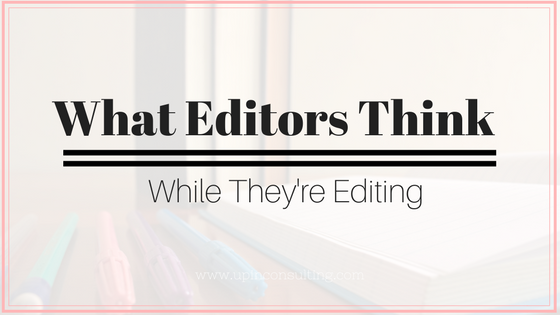Have you ever considered working with an editor and then talked yourself out of it? Perhaps you said something to yourself like, “I don’t need one more person to tell me what’s wrong with this article,” or “I’ll get all the comments I need during the revise and resubmit process.” In both instances, you may be trying to shield yourself from what you consider to be unnecessary, and perhaps mean-spirited judgment.
Writers seek my services because they want help. This does not, however, mean I assume they’re a bad writer. I’ve written about the false relationship between being a “bad” writer and seeking help here and here. I’ve also written about what I do during the editing process. In this post, I am going to focus on how I think about the editing process.
What goes through an editor’s mind while they’re editing?
I like to joke with my clients that I’m like Reviewer 2, but not an asshole. But, there is another, even more important distinction between an editor and a reviewer. My job is not to render a final judgment concerning whether your manuscript should be placed in a journal or published by a press. Instead, my job is to work with you to bring your manuscript closer to completion, no matter what stage it’s currently at.
I generally evaluate my clients’ work based on my assessment of how far it is from completion. This helps me determine two important things: what level of editorial intervention is needed, and what the next step will be for the author. It also means that I don’t look at any author’s writing as essentially bad, or ever believe that an editorial intervention would be futile.
Do editors think about writing as good or bad?
I don’t use this distinction. I think it’s lazy, and that we use it to impugn writers’ abilities. “Good” and “bad” have a finality to them – that once you are identified as one or the other there is no opportunity for you to change. That’s simply not true. I do, however, believe that writers have strengths and weaknesses. I also believe this is true of athletes, musicians, physicians, etc – basically any person with a skill set. What I don’t believe is that saying a writer has a weakness means I am making a normative evaluation of their worth as a writer. What I find most rewarding about working with clients on a long-term basis across multiple writing projects is that I can identify those writing quirks and help the writer to also identify them and then remedy them. This is an iterative process.
I also believe that for developmental editing, there is an enormous amount of subjectivity in identifying “good” or “bad” writing. In copyediting, an editor can identify grammatical errors and quickly resolve them. There are rules for grammar and spelling that are, for the most part, relatively straightforward. A copyeditor may also have rules from a journal or publisher (called house style) that they must abide by when editing. A copyeditor’s job is not always limited to correcting grammar, but for that portion of the job, there is clear guidance. For developmental editing, I believe there is more than one way to write a manuscript that is publishable. Similarly, there is more than one way to write elegant prose or to develop a compelling argument. I’m sure we can all think of individual pieces of writing that we enjoy and recognize that they might have some things in common but perhaps not that much.
But to return to my point about bringing projects closer to completion, I think that manuscripts people would identify as “bad” I simply consider not yet ready. Just as you wouldn’t say that flour, water, and yeast mixed together in a bowl is a bad loaf of bread, I wouldn’t say that a piece of writing that lands on my desk is a bad manuscript. Rather, it needs more work. Unfortunately, as a community academics value revision about as much as they talk about it (which is very little). We’re also trained to be intensely critical, which means we’re more likely to denounce a piece of writing as bad – THE END – than to think about how it could be revised.
I’m an editor, but I was first a tenure-track professor and before that a graduate student. Before that, I was an undergrad at the University of Chicago. So to say that I’ve had to unlearn the impulse to harshly critique other people’s work would be an understatement. My job as an editor is (obviously) not to alienate my clients, or to make them feel bad about their work. Nor is it to prove my intellectual superiority. It’s to help you as a writer create work that you are proud of, that is publishable.
I think one reason that writers are anxious about working with an editor is that they project their own insecurities about their writing onto the editor. We’re often our own worst critics, and we expect that the readers of our work will be similarly harsh towards our writing. This isn’t always true. If you’d like to change your attitude towards your writing, or how you critique your colleagues’ writing, then please download my list of 3 Mindset Shifts to Change How You Evaluate Your Writing. The list is simple and will help you to reframe your thoughts about writing. You’ll also approach drafts with more empathy.
Thanks to Jen Polk (@FromPhDtoLife), Margy Thomas (@ScholarShape), and Michelle Dionne Thompson (@mdionnethompson) for a lively Twitter discussion that motivated me to write this post.
